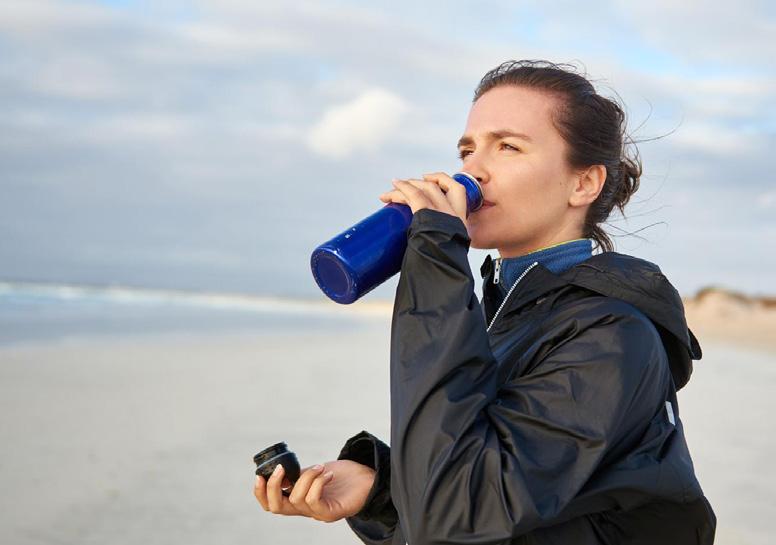
6 minute read
Well-Being - Beating an Ill Wind
For years people have thought there was a correlation between the weather and health. Now, thanks to research by atmospheric scientists into biometeorology (the study of the weather’s impact on the human body), it has been proven that cold snaps, heat waves and changes in temperatures definitely have a direct effect on certain health conditions.
THE REASONS WHY
Advertisement
The changes in barometric pressures that come with cold temperatures and windy weather or storms are a typical cause of migraines and headaches, as well as other ailments.
Ask anyone with arthritis and they will tell you that they know when the temperatures have dropped or rain is in the air. This may be because inflamed joints swell more in lower air pressures, that a lack of sunlight has left the body low in Vitamin D, or that inactivity in bad weather has caused joints to stiffen.
Cold weather doesn’t help with blood pressure (BP) either. As the body conserves heat during winter and sends blood to essential organs, blood flow can be constricted and BP can rise and, with it, the risks of a heart attack increase. In fact, the British Medical Journal (BMJ) has reported a rise in ischaemic heart disease in those aged over 65 shortly after the winter drop in temperature.
Lung problems such as bronchitis and emphysema are undoubtedly exacerbated by allergies and, although summer has long gone, there are still allergens in the air from things like mould and dust mites. Storms whip up pollen grains from the ground and cause many asthma attacks, whilst sudden changes in temperature can lead to coughing, wheezing and shortness of breath.
Other winter conditions such as influenza (flu) can be very dangerous for people over 65, and gastroenteritis, which is often mistaken for flu but is actually a different virus which affects the stomach, is rife at this time of year.

As the cold and wind dries the skin, eczema can become worse unless the skin is kept well hydrated, and winter rashes, which are similar in appearance in that the skin is itchy, flaking, sensitive, red and swollen, can last for months. If your extremities have been exposed to cold air, warm them up slowly to avoid painful chilblains. If you become too cold and your body’s temperature drops below 35°C (95°F) there’s a risk of hypothermia and, be warned, as incredible as it may seem, there has been an increase in frostbite in the last 20 years, especially amongst those working outdoors.

HOW TO KEEP WELL
As nice as it is, staying home, wrapping yourself up and watching TV by the fire can be bad for you! Sedentary behaviour can increase your chances of contracting a virus, stiffen the joints and leave you less fit and able to ward off illness. Here are some ideas to help fight winter ailments.
• Drink plenty of fluids.
• Sleep is part of the body’s defence so ensure you have enough of it.
• Stop the spread of bugs with regular hand washing and don’t share towels.
• A humidifier in the bedroom will prevent cold, drier air from leading to sore throats in the morning.
• The tell-tale stiffness, aches and pain of arthritis can be relieved by warm showers but it’s essential to keep the affected joints warm and dry.
• Heat packs can soothe pain, and wearing tighter clothing such as therapy gloves or compression socks can restrict swelling whilst keeping the area warm.
• Treat yourself to a skin moisturiser to ensure proper hydration.
• Enjoy a diet rich in calcium and vitamins C and D. • Use tissues instead of cotton hankies and throw the germs away.
• Don’t forget to exercise or have a massage – both will improve blood flow and helps strengthen the immune system.
• You either love ‘em or hate ‘em but flu jabs work for many of us and are available free to the elderly, as well as people with certain conditions such as low immune systems or diabetes. Staying warm, keeping hydrated, taking exercise and employing good hygiene seem to be the keys to good health over the winter.

Exercise, at any age, helps you keep fit and healthy.

Stay hydrated, have lots of sleep and try a humidifier to prevent dry throats.
TRUE OR FALSE?
Today’s theory is that there is no medical reason to under or over eat for either ailment. Your body just needs a balanced diet of nutrients and sufficient calories to fight off infection.
As for “Vitamin C cures the common cold”, a 2007 report found that taking 200mg of vitamin C (two to three times the recommended daily dose) not only reduced sick days from 12 to 11 a year but, also, reduced the number of colds in people who were under extreme stress by 50%!
Let’s not forget
A 2015 study found no evidence that this was true but did find that people who ate an apple a day used fewer prescription medications. Plus it would be one of the essential five-a-day.

ASK KATIE!
Katie Gardner is a fully-qualified CBT Counsellor and 11-year expat based on the border of 47/24.

www.kgcounselling.com
Q Felicity G
I constantly feel very low, overwhelmed and anxious. A couple of times it has seemed easy to end it all. Not that I would, but I am worried about the fact that it has crossed my mind.
A - Hello Felicity
So many of us often feel this way and what is called for is a period of reflection, evaluation and some (probably very difficult) introspection.
Self-care is not just a 5-minute bubble bath or half an hour not looking at your phone. It is sitting down with an open mind, a piece of paper and a pen and really thinking about all people and situations in your current life, and evaluating their impact on your emotional health. It is making a spreadsheet of your debt, of sticking to a positive morning routine, of cooking yourself healthy meals and no longer just running from or trying to ignore your problems - and calling the distraction a solution.
and sometimes the fixes are not easy but, with increased clarity of thought, they can often be ameliorated into something more acceptable and liveable-with. It’s also the small stuff, like allowing yourself to sometimes have a dirty kitchen or deciding your ultimate goal in life isn’t going to be to lose 2 stone or to keep up with ‘friends’ from whom emotionally you gain nothing. It is making a conscious, evaluated choice to build a life you don’t need to regularly escape from. You can be happy but first you need to know, in detail, what is making you unhappy. Start now and I wish you well.
If you have a life concern that you would like to share, please write to Katie c/o buzzing@thelocalbuzzmag.com.




The Local Buzz is the only A4 glossy magazine and comprehensive website covering these departments. Lifestyle focused, the magazine is informative, fun and highlights what’s on in the region. Looking for a local business, more listings of what’s on, articles, blogs and local information? Then visit our website at www.thelocalbuzzmag.com
By the way, if you can’t pick up a copy, every issue can be read on the website at www. thelocalbuzzmag.com/ read-online, and postal subscriptions are available.








